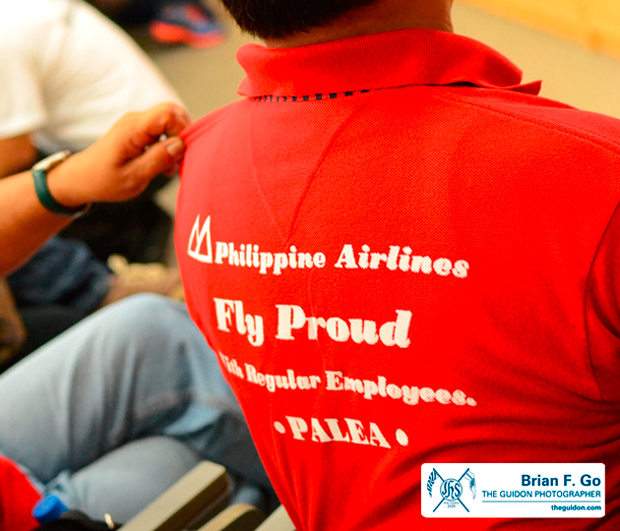RECONCILIATION BETWEEN flag carrier Philippine Airlines (PAL) and the Philippine Airlines Employees Association (Palea) has been achieved, putting an end to the latter’s two-year long strike against outsourcing and contractualization.
PAL has consented to reinstate Palea’s 600 members as regular workers, formalizing the agreement last November 15, 2013 at Terminal 2 of the Ninoy Aquino International Airport. In a press briefing, Trade Union Congress of the Philippines President Democrito Mendoza commended the two parties, calling the reconciliation “a great union victory.”
In 2010, PAL’s then-management opted to outsource three of its “non-core” departments, resulting in over 2,600 employees losing their jobs. As a result, everyday since April 2011, Palea’s members stationed themselves in a makeshift camp by the PAL terminal to protest against PAL and unfair labor practices.
Beginnings
PAL’s decision to subcontract its non-core departments, namely the airport service division, call center reservations department and in-flight catering division, was allegedly brought about by the companies’ financial losses in 2008 and 2009. According to Sunstar, it was estimated that the company incurred a deficit of over P15 billion.
Palea filed a Notice of Strike on January 28, 2010 on the grounds of intended mass lay-off of union members and illegal outsourcing of regular positions. PAL later announced that it sent letters of termination to 2,604 employees.
On April 26, 2010, former Department of Labor and Employment (DOLE) Secretary Marianito Roque issued an Assumption of Jurisdiction Order, effectively delaying both PAL and Palea’s planned actions until an official resolution was reached. Only eight days after the submission of the order, Acting Labor Secretary Romeo Lagman announced a decision adverse to Palea, saying the mass termination “was based on lawful ground and all in a valid exercise of a managerial prerogative.”
Palea condemned Lagman’s ruling as a midnight decision. In a rally against DOLE, Palea Chairman Gerry Rivera told GMA News that the basis for the decision was unfounded. “Contrary to the finding of Lagman, there is no subsidiary corporation formed by PAL. What is really involved here is the outsourcing of functions wherein regular rank-and-file employees and union members will be terminated… Upon closer examination, you will find that retrenchment is not necessary… We stand by our fight,” he said.
The resolution
Then, on November 15, 2013, Palea formally won its battle against contractualization after a series of progressive negotiations with PAL’s new administration.
“I offer our trade union salute to my union brothers and sisters in the Palea for their uncommon collective resilience, steadfast courage and indomitable solidarity demonstrated in more than two years of union struggle. They have proven to fellow trade unionists, to the Filipino people and to the working people around the world that devotion to these trade union principles is important in achieving social justice,” Mendoza told GMA News.
Christian Union for Socialist and Democratic Advancement (Crusada) Premier Rico La Viña said that Crusada is one with Palea’s triumph. “We’ve organized forums [about Plaea] in Ateneo, give [their camp] relief goods, attend their rallies and meetings and help them bring their message to the youth. We’ve known them for years now. We’ve heard their stories. We can’t help but feel that their victory is our victory.”
Partido ng Manggagagawa Chairman Renato Magtubo said that Palea’s fight serves as an example of how workers can be empowered by being educated of their rights as employees. “This is the lesson we have learnt from the recently concluded struggle of Palea: That through their collective resistance in standing up to their labor rights and with the sustained support of labor organizations and its allies, they have effectively defended their regular jobs.”
“My biggest takeaway from this is that justice isn’t an unreachable ideal but something that we can work for. You can achieve justice if you stand your ground and remain committed to your principles. Palea is certainly proof of that,” La Viña also said.
“Laban ng lahat”
Magtubo stresses how contractualization can serve as a major obstacle in the proper observance of labor rights and practices. “Workers hired on casual or contractual employment generally receive low wages and benefits,” he said.
“Generally, they feel insecure with their jobs, knowing that eventually they will be terminated, or that they can be fired at anytime. This feeling of insecurity and control of employers over them dampen their desire to exercise their basic rights enshrined in the constitution and labor laws.”
“The antidote to this insecurity… is for them to be educated, guided and supported by labor organizations and allies in their struggle to overcome the ‘fear’ and to stand up for their rights,” he added.
La Viña also said that the concerns Palea stood for are also the concerns of the Ateneo community. “It is in everyone’s interest to support the Paleans because we are all going to have to get jobs someday. It is in our best interest to make sure that labor unions have rights since many of us will become laborers ourselves,” he said.
“Of course, the fight against contractualization doesn’t end here. We look forward to the day when Palea’s victory becomes the rule rather than the exception,” he added.
Chairman Magtubo says that engaging the youth in labor concerns is a vital step towards achieving future responsible employers and workers. “Education plays an important role in [the fight for labor dignity]. The sustained support and solidarity of labor organization, along with the universal importance of labor rights and empowerment truly validate the slogan, ‘Ang laban ng Palea ay laban ng lahat’ (‘The fight of Plaea is the fight of all’).”




